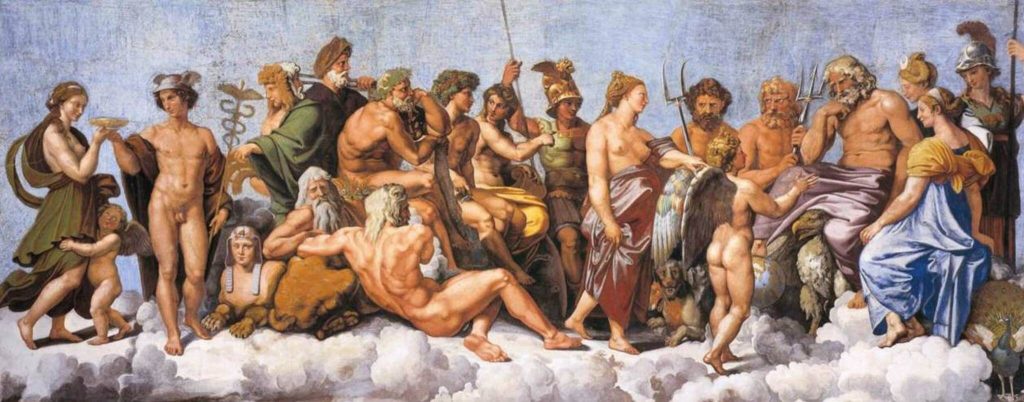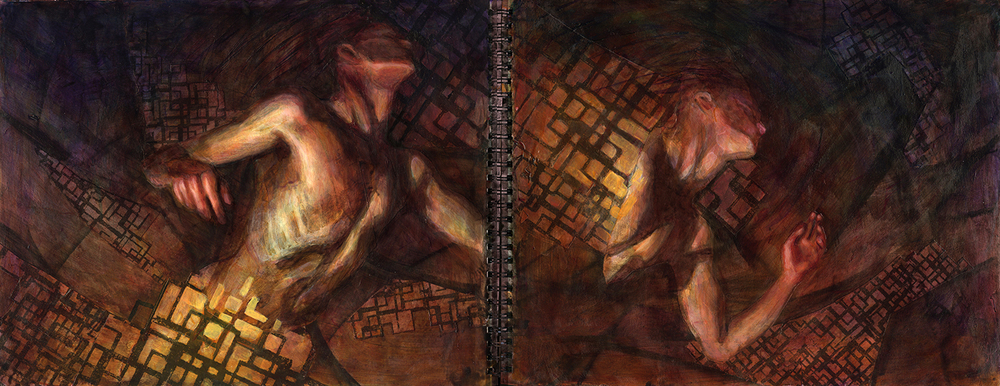Healing Wetiko, the Mind-Virus that Plagues Our World
Wetiko is a Native American term that can be conceived of as being a mind-virus that operates through our psychological blind-spots. Covertly working through the projective tendencies of our minds, wetiko surreptitiously—beneath our conscious awareness—flavors our interpretations of and the meanings we place onto the world such that we unwittingly become instruments to act out its agenda (which we can be assured is contrary to our own best interests). As if under a self-generated spell, when we are afflicted by wetiko (which we all potentially are, as it exists in the collective unconscious of our species), we entrance ourselves via our own projections onto the inkblot of the world, literally hypnotizing ourselves in the process. A master impersonator, wetiko has no intrinsic creativity on its own, but its strategy is to plug into and use our own creative nature in a way that lets it get away with murder at our expense.
Our narratives—the stories we tell ourselves about what is happening in our world—are the interpretive frameworks through which we make sense of our world. Internally consistent and self-reinforcing from within their own viewpoint, these narratives have a spellbinding effect upon our minds. This makes it hard to take in evidence that is contrary to our viewpoint. Each of us has a particular narrative that we invest in as being objectively, unimpeachably true, what can be called our “narrative bias.”
The Danger of Not Seeing the Bigger Picture

Some of us understandably feel despair and pessimism because of the dark agenda that is undeniably being implemented not just behind the scenes, but on the main stage of the world for all who have eyes to see. There is very convincing real-world evidence to justify the pessimistic point of view of our narrative bias. Others of us can hold out the possibility that a deeper good might be emerging out of the collective nightmare that we are living through. This is a viewpoint that can seem naive and ridiculous from the perspective of those whose narrative bias is pessimistic.
If someone has fallen prey to pessimism, thinking that they are helpless to change the trajectory of our species’ suicidal behavior, they will see the world through a lens that draws evidence to confirm their pessimistic viewpoint. This results in them being even more convinced of the validity of their viewpoint and the objective nature of what they are seeing in an infinitely regressing, self-generating samsaric cycle, a self-fulfilling prophecy. They wouldn’t be so pessimistic if our world wasn’t manifesting so darkly, and our world wouldn’t be manifesting so darkly if they weren’t so pessimistic. It is important to note that wetiko both inspires and feeds off of an overly pessimistic attitude.
The question naturally arises: In their pessimistic viewpoint, are they just being sober-minded “realists,” having a justified response to the reality of our situation? Or have they become entranced by the creative genius of their own mind to call forth reality in an image confirming their pessimistic viewpoint? It should get our attention that there is something flawed in our logic if the accomplishment from winning a debate about the truth of our pessimism is that we are screwed. It is noteworthy that if someone becomes entrenched in their pessimistic point of view, they have become unwittingly complicit in creating their own worst nightmare.
On the other hand, I’ve noticed that when I point out the darker agenda to people who are identified with an overly one-sided, spiritual, and optimistic point of view, they get upset. They don’t want to put their attention on the shadowy goings-on in our world. This might be for fear of thinking they’d be feeding the darkness by focusing their attention on it. Or perhaps they might sense that they’d get overly stressed out, anxious, and depressed if they took in the darkness, in which case they couldn’t be of help to anyone. By holding onto an overly optimistic, light-filled viewpoint, however, while marginalizing the darker, more frightening point of view, they are avoiding relationship with their own inner darkness. They thereby unwittingly make it more probable that the very darker reality that they are denying will actually manifest. Similar to over-pessimism, wetiko simultaneously inspires and feeds off of an overly optimistic attitude.
And yet these two polar opposite points of view—though seemingly contradictory and mutually exclusive—can both be seen to be potentially valid depending on the reference point through which they’re viewed. The pessimistic viewpoint sees us creating hell on Earth, and the optimistic point of view imagines that the pandemic will bring in a new, more grace-filled world. All of the possible universes exist in a state of quantum superposition, like multiple transparencies overlaid on each other, and which potential reality actually manifests depends upon our creative response (or lack thereof).
There is a psychological phenomenon that happens when we see an aspect of the truth. This is that oftentimes we fall prey to imagining that what we are seeing is the whole truth, instead of realizing that we are only seeing one of its many multi-textured facets. Seeing a partial truth but being certain that we are in possession of the whole truth can actually serve to obscure us from seeing a more comprehensive truth. This is a process that, once again, wetiko both inspires and feeds off. We ourselves then unknowingly become our own agents of obfuscation.
Many people, based on their narrative bias, are identified with one point of view, which is not only seen as true, but is conflated with “Truth” itself. This is often done to the exclusion of the contrary viewpoint, which is not only deemed to be false, but oftentimes seen as something dangerous and/or evil. One of the results of this is to divide and separate us among ourselves based on whichever particular reality tunnel (to use author Robert Anton Wilson’s phrase) we inhabit in the moment. People who are interpreting the world the way we see it validate the rightness of our point of view and are seen as allies. People who view things differently than us are typically seen as “others.” They are seen as having a deluded perspective and are deemed a threat to our version of reality, which creates a sense of judgment and separation from those who hold a different viewpoint.
Becoming divided among ourselves is part of the effect of the mind-virus that we are unwittingly colluding with through our fixed views. When we become divided and polarized, we are more easily manipulated and controlled (divide and conquer) by outside forces. If we become stuck in our viewpoint we are actually enabling the virus to propagate itself at our expense. This is to say that this virus of the mind depends on our cognitive prejudices to keep itself in business, so to speak.
Just like a dream compensates a one-sidedness in the dreamer, oftentimes the counter-narrative to our own may contain some facet of truth, some important piece of the bigger picture. This, if recognized, can enhance and flesh out our perspective. The exception, of course, is when someone’s narrative is simply deluded and out of touch with reality, a result of the pervasive brainwashing propaganda that seems to be everywhere in our world today. If we are able to find even the smallest grain of truth in the opposing viewpoint, however, it can help us to dispel our sense of separation from the other person who seems to be holding a contrary perspective to our own, which increases our compassion.
In our world today it is as if people are inhabiting two parallel universes, with no intersection of viewpoints between the two. It behooves us to access a metaperspective such that we can see the differing viewpoints of both parallel universes simultaneously, without solely identifying with—and hence, being caught by—one or the other.
What I notice in myself is an ever-growing capacity to simultaneously hold a metaperspective from which both seemingly opposing points of view are seen as potentially true. I am not turning a blind eye or marginalizing either of the two extremes, nor identifying with one at the expense of the other.
This is to step out of the limited two-valued, binary logic—which sees things as either true or false—into the more expanded four-valued quantum dream logic, which is able to see things as both true and false at the same time.
I see both the potential nightmare as well as the potential lucid dream, so to speak. And though it can be painful to hold the tension of these opposites, I continually cultivate the ability—like going to the gym to build up my psycho-spiritual muscles—to hold both possibilities in my mind’s eye and see what spontaneously emerges out of the creative tension this elicits in my psyche.
Consciously holding the tension of the opposites within our own awareness without splitting off and identifying with either of the opposites (either optimistic or pessimistic) is an intrinsic superhero power that we all possess, knowingly or unknowingly. Interestingly, holding the tension of the opposites is experienced as—and symbolized by—a veritable crucifixion of our limited egoic identity. Is this to be genuinely imitating Christ and, as he counseled his followers to do, carry our own cross?
Humanity has been hobbled by our narrative biases. Instead of locking down on one narrative, the ability to have a comprehensive, omniperspective of the world—where instead of seeing only a partial view of what might be happening, we are more able to see the big picture—is a critically important evolutionary capacity that we are each being called to develop.
If, due to our narrative bias, we identify with one of the opposites as being true and the other as being false, however, we dissociate within ourselves. This disconnects us from our wholeness and forecloses on our ability to access genuine compassion. Abnegating our ability to be of benefit to a world so greatly in need of our help, we then become unwittingly complicit in participating in the unfolding world catastrophe, which would be truly tragic.
We can be of maximum benefit to both ourselves and the world at large when we are intimately connected with our intrinsic wholeness, whose natural perspective is not fixed in any particular dogmatic viewpoint or fixed narrative but sees things from as many points of view as we are able to imagine.
Wetiko by Paul Levy © 2021. Printed with permission from the publisher, Inner Traditions International. www.InnerTraditions.com






